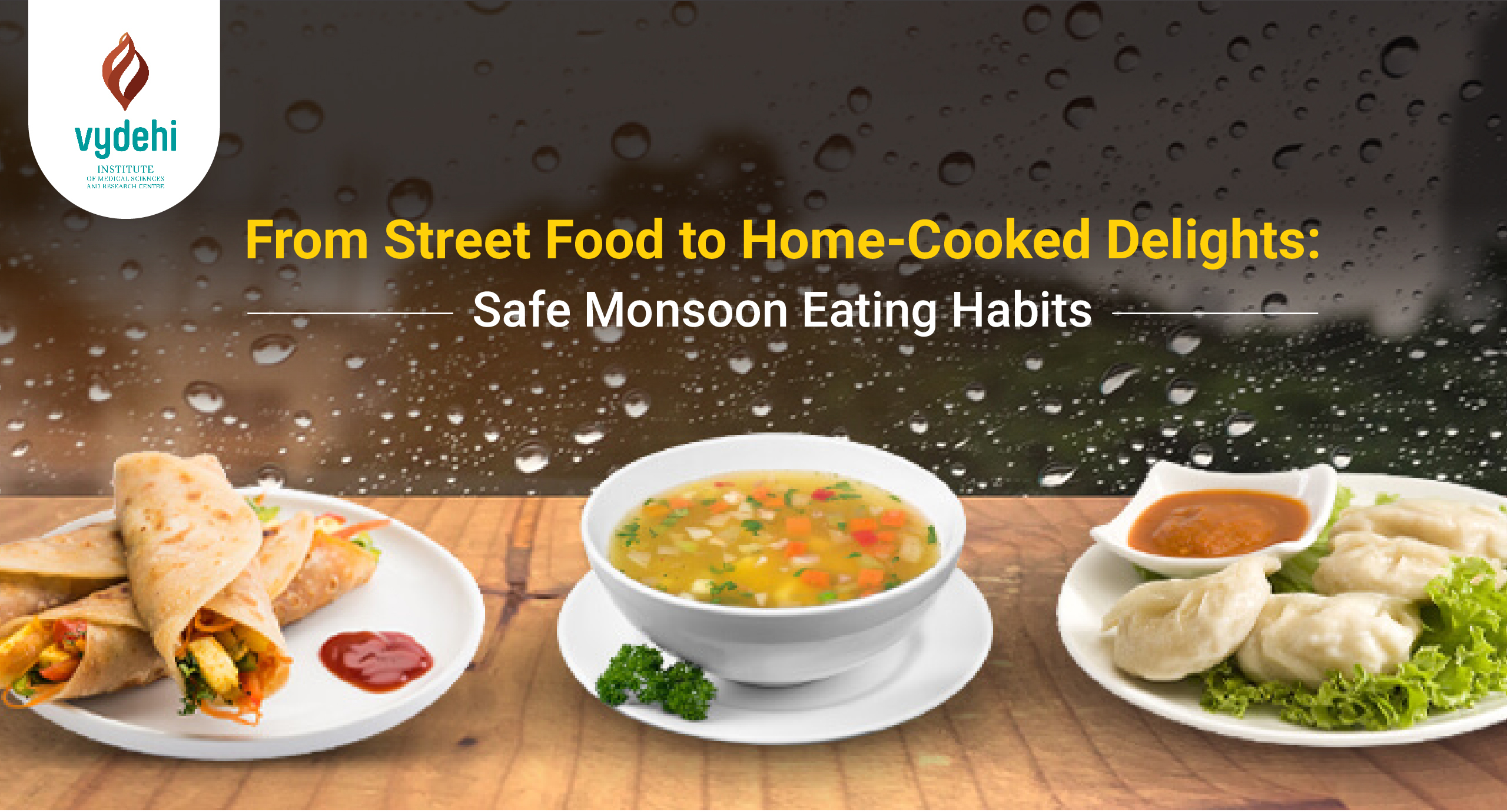Beat the Monsoon Blues: Safe and Delicious Monsoon Food Safety Tips and Healthy Recipes
The monsoon season brings with it a refreshing respite from the scorching heat, but it also comes with its own set of challenges, especially when it comes to food safety. Bangalore’s monsoon can be a delightful experience, but the damp weather also brings its share of health concerns, especially when it comes to food. Let’s explore how you can savor the flavors of the season while safeguarding your health.
Monsoon Food Safety Tips
Bangalore’s bustling life and the allure of street food can be irresistible, but it’s essential to prioritize food safety during the monsoon. Here are some crucial tips:
- Wash your hands thoroughly: This is the most basic yet effective way to prevent the spread of germs. Wash your hands with soap and water before preparing, serving, or eating food.
- Choose fresh produce carefully: Opt for fresh, unbruised fruits and vegetables. Although, Bangalore’s markets offer a variety of fresh produce, but proper handling is essential. Wash fruits and vegetables thoroughly before consumption.
- Cook food thoroughly: Ensure that meat, poultry, and seafood are cooked to their internal temperatures. Avoid consuming undercooked food.
- Store food properly: Refrigerate cooked food promptly to prevent bacterial growth. Cover food to protect it from contamination.
- Beware of street food: While it’s tempting to indulge in hot, crispy treats during the monsoon, it’s advisable to exercise caution. Look for vendors who maintain good hygiene practices.
Healthy Eating Habits During Monsoon
Bangalore’s fast-paced lifestyle often leads to unhealthy eating habits. Let’s focus on making nutritious choices during the monsoon:
- Boost your immunity: Include immunity-boosting foods like citrus fruits, ginger, turmeric, and garlic in your diet. These foods help strengthen your body’s defense system.
- Embrace local flavors: Bangalore’s diverse culture offers a range of healthy options. Incorporate local ingredients like ragi, coconut, and lentils into your meals.
- Stay hydrated: Dehydration is common during the monsoon. Drink plenty of water throughout the day to keep your body hydrated.
- Opt for warm and comforting foods: Indulge in warm, comforting meals like soups, stews, and khichdi. These foods help keep you warm and nourished.
- Limit heavy, oily food: While it’s tempting to indulge in fried and oily snacks, it’s best to limit their consumption as they can upset your stomach.
- Include probiotics: Yogurt and fermented foods like kimchi and sauerkraut can help maintain gut health during the monsoon.
Also, Read about Monsoon Malady: Enjoy the Rains with Caution for your Health
Monsoon Diet Plan: A Sample
A balanced diet is crucial for overall well-being, especially during the monsoon. Here’s a sample diet plan to give you an idea:
- Breakfast: Enjoy a South Indian breakfast like idli and chutney or a masala dosa.
- Lunch: Opt for a light meal like ragi mudde with vegetable curry or bendekai palya.
- Dinner: Warm up with a bowl of rasam or a comforting tomato rice.
- Snacks: Munch on roasted chana, poha, or homemade rava ladoo.
Remember, this is just a sample, and you can customize it based on your preferences and dietary needs.
Home-Cooked Recipes for Rainy Days
Indulge in the comfort of home-cooked meals during the monsoon. Here are a few healthy and delicious recipe ideas:
- Vegetable soup: A hearty and nourishing soup packed with vitamins and minerals.
- Spiced-up chai: Enjoy a warm and comforting cup of chai with ginger and cardamom.
- Masala dosa with coconut chutney: A classic South Indian breakfast with a healthy twist.
- Vegetable pulao: A flavorful and satisfying one-pot meal.
- Bisi bele bath: A flavorful one-pot meal packed with nutrients.
- Ragi mudde with chutney: A traditional and healthy option.
By following these guidelines and incorporating healthy eating habits into your routine, you can enjoy the monsoon season without compromising your health. Remember, prevention is always better than cure. Would you like to add any specific recipes for a monsoon diet plan? Mention in the comments.
Frequently Asked Questions
1. What are some of the monsoon food safety tips?
Ans: Monsoon food safety is crucial. Wash hands and food thoroughly. Cook food completely. Store food properly in the refrigerator. Avoid street food or ensure vendors maintain high hygiene standards. Stay hydrated and consume immunity-boosting foods like citrus fruits and ginger.
2. What foods to eat during monsoon?
Ans: Opt for immune-boosting foods like citrus fruits, ginger, and turmeric. Include warm and comforting dishes like soups, khichdi, and vegetable pulao in your monsoon diet. Prioritize fresh, cooked food. Stay hydrated by drinking plenty of water. Avoid heavy, oily food.
3. What are the healthy snacks for the monsoon season?
Ans: Enjoy healthy monsoon snacks like roasted chickpeas, nuts, and homemade yogurt. These provide essential nutrients without compromising your health. Avoid processed and packaged snacks. Incorporate seasonal fruits into your snack time.
4. What are some of the Indian monsoon recipes?
Ans: Indulge in delicious Indian monsoon recipes like masala dosa with coconut chutney, vegetable pulao, and spiced-up chai. These dishes are not only comforting but also packed with flavors. Experiment with different spices to enhance taste and boost immunity.

 Emergency Number
Emergency Number
Great article! It’s so important to stay mindful of hydration and boost immunity with ingredients like ginger and turmeric during the monsoons.
A must-read for food lovers! The monsoon diet plan and healthy recipes sound delicious and comforting.